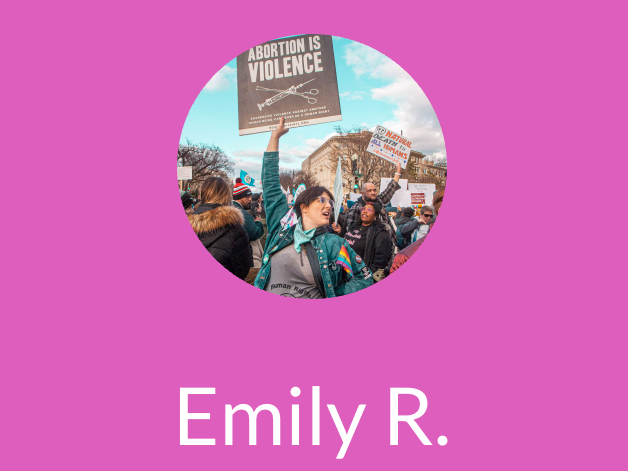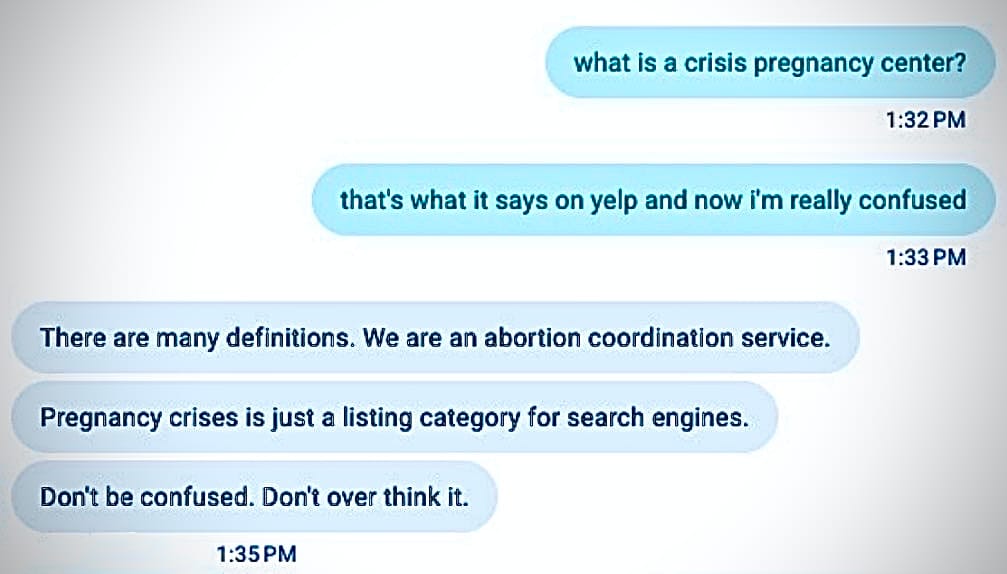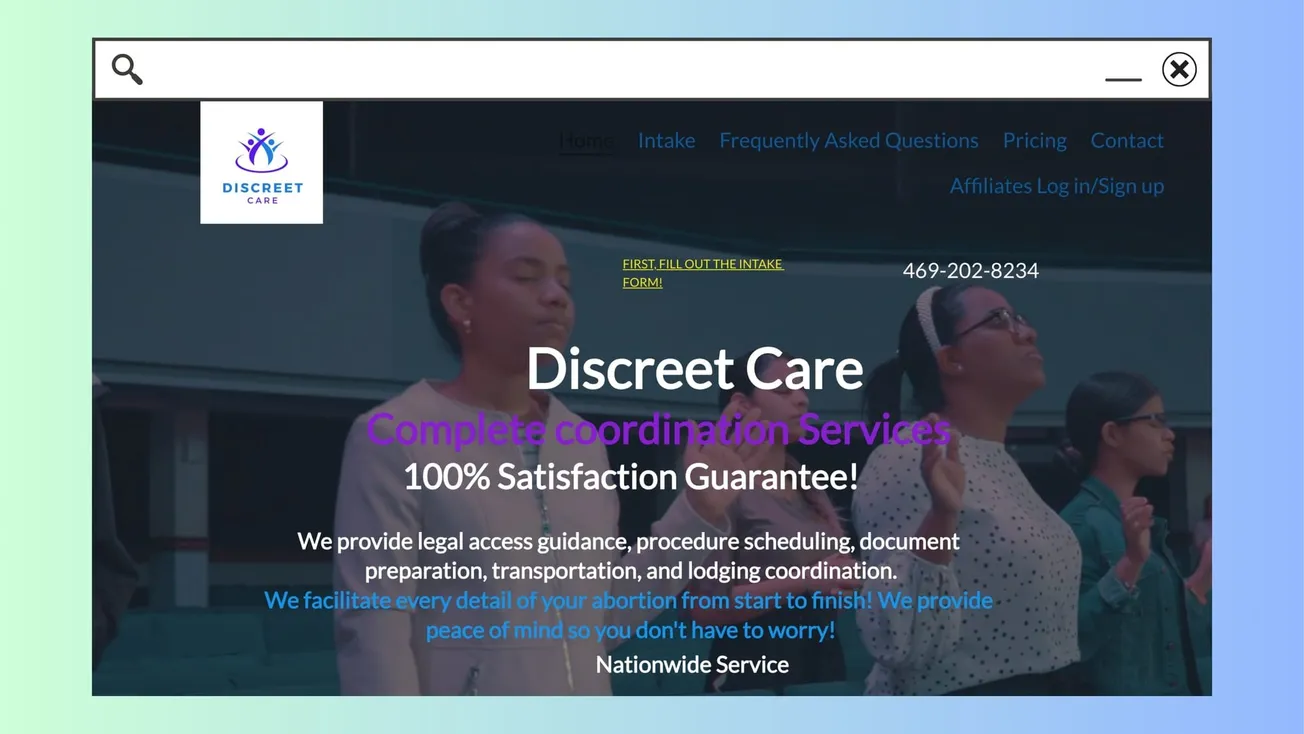On May 6, Alamo Women’s Clinic—an abortion provider that operates clinics in New Mexico and Illinois—received a strange email in its general inbox. The subject line read, “Partnership Opportunity: Seamless Abortion Coordination & Support with Discreet Care.”
In the email, which the clinic shared with Autonomy News, a person identifying himself as Greg Thomas described Discreet Care as “a full-service abortion coordination and concierge agency.” His message included a bulleted list of services: “coordination of appointments at vetted, legal clinics, travel and lodging logistics, full planning and aftercare guidance, 24/7 client support, one-on-one case management, [and] peace of mind for clients and staff alike.” Thomas invited Alamo to “become a Discreet Care Affiliate,” promising to “relieve coordination burdens on your staff.”
What the email didn’t mention is that these services come with a $1,200 price tag, according to Discreet Care’s website. This is a significant red flag considering that trusted abortion funds, practical support organizations, and hotlines already provide most of these services for free. Beyond that, abortion “concierge” services don’t really exist. The website itself is very strange, featuring an outdated design, imagery of what appear to be churchgoers, and an anti-abortion protest sign.
Alamo staff didn’t respond to the email. Instead, they reported it to the National Abortion Federation (NAF), which provides security support for abortion providers. Alamo wasn’t the only clinic contacted, NAF’s chief program officer Melissa Fowler told Autonomy News. “In early May, NAF's security team received reports from both member and non-member facilities in Texas, New Mexico, and Colorado that they had received suspicious emails and phone calls from Discreet Care,” Fowler said.
Eagle-eyed abortion support workers had taken note of Discreet Care even before it began reaching out to clinics. Autonomy News received its first of several tips about the group on April 16—a mere two days after the organization’s web domain, discreetcare.net, was registered. (The registration is private, so Autonomy News was not able to determine who owns the domain.)
Colorado’s Cobalt Abortion Fund became aware of Discreet Care in mid-April, director Melisa Hidalgo-Cuellar said in an email. “Clinics that we partner with reached out to us and let us know that Discreet Care contacted them hoping to establish a referral relationship,” Hidalgo-Cuellar said. “We checked with other trusted sources in our network who raised concerns about them, as did members of our team.”
As word spread, workers and volunteers in the abortion care space wondered: Was Discreet Care just a scam, or could it be a project of the anti-abortion movement?
How anti-abortion groups take advantage of vulnerable people
Both options—grift or anti-abortion dragnet—seemed equally plausible. “Crisis pregnancy centers,” also known as anti-abortion centers, have long been known to collect sensitive personal information from people who walk through their doors, and use digital surveillance techniques to harvest even more data about abortion seekers. They often claim that they are bound by the Health Insurance Portability and Accountability Act (HIPAA), and say they follow HIPAA-compliant privacy practices. But since most aren’t legitimate medical facilities, they don’t have to comply with HIPAA.
In the three years since the Supreme Court’s Dobbs ruling that overturned Roe v. Wade, CPCs have taken advantage of shifts in the landscape, including abortion patients’ increasing need to travel for care and the rise of telemedicine for abortion pills. In one 2022 incident, a patient traveled to Colorado for what they thought was an appointment at an abortion clinic—but was actually at a CPC. Advocates can’t be sure how many more times this has happened. Plus, more and more CPCs are now posing as telehealth abortion providers.
On the flip side, other suspicious ventures have also proliferated since Dobbs. There was Michael Kimbro, the accused fraudster who claimed to be providing abortions on a boat in the Gulf of Mexico and later faded from public view. There was the failed abortion pill service MAP_US, whose inexperienced founder said she wasn’t trying to scam customers, but was herself scammed by a dishonest pill supplier. (Regardless, people who ordered abortion pills from her either didn’t receive them or received them very late.)
When it comes to this latest enterprise, in NAF’s view, the answer is simple: Discreet Care is “an anti-abortion crisis pregnancy center falsely posing as an abortion concierge service,” Fowler said. She added that the emails and calls to clinics “appeared to be part of a phishing campaign intended to gather patient and provider information under false pretenses.”
NAF has tracked incidents of violence and disruption at abortion clinics since 1977, and proactively monitors anti-abortion activists and extremists so that it can alert its members to any potential risks. Early messages from Discreet Care to clinics originated from at least three different email addresses, Fowler said. NAF’s security team, she added, determined through its internal research that one of these email addresses belonged to “a known anti-abortion individual” named Michael Langford, who is active in New Mexico and Texas. Autonomy News was not able to independently identify Langford or verify this connection.
A phone number included in one of the emails, Fowler said, was also associated with a Yelp page, which shows a Duncanville, Texas, address for Discreet Care and labels it as a CPC. Yelp would not confirm to Autonomy News how or when this label was applied, but its trust and safety site explains that these determinations are made based on manual moderation and customer reviews, among other factors. Reviews for Discreet Care on both Yelp and Google Maps appear to come from abortion rights advocates who left them in an attempt to warn unsuspecting abortion seekers. The Yelp page says it was “updated” two months ago—right around the time Discreet Care’s web domain was registered.
The only individual Autonomy News was able to link to Discreet Care was Gregory Thomas—the apparent sender of the email received by Alamo. A search on the background check platform BeenVerified identified Gregory Thomas as the “likely owner” of the phone number in that email signature, and a Desoto, Texas, address associated with that number lists Thomas as both an owner of the property and a debtor on two liens that have been filed on it. Both towns are suburbs of Dallas.
NAF sent a bulletin to its members, warning them not to respond or provide any information to Discreet Care. Still, not all abortion clinics and funds are NAF members, and, chillingly, the website appears to be targeting abortion seekers directly.
Discreet Care’s bizarre website
The Discreet Care website certainly has hallmarks of a CPC, particularly in the way it describes abortion procedures. For example, on its frequently asked questions page, Discreet Care uses the phrase “late-term abortion.” While commonly used in media reports, this term is actually a medically inaccurate invention of the anti-abortion movement—not one legitimate abortion providers tend to use.
The FAQ page also emphasizes potential serious complications of abortion, despite the fact that such complications occur less than one quarter of 1 percent of the time. Exaggerating or inventing potential risks associated with abortion is a common CPC tactic. Discreet Care also mentions working with a “Nationwide Network of Abortion Funds”—an uncanny valley-style rendering of the name of the actual National Network of Abortion Funds. This is yet another well-known CPC strategy: closely mimicking the names and branding of legitimate abortion providers and service organizations.
In fact, Discreet Care’s entire website has that uncanny valley quality. Something about every element is just a bit… off. Text appears in at least five different colors, often placed atop background colors that make it difficult to read. Social media icons in the site’s footer lead to the platforms’ homepages, not to an individual account. The first visual on the homepage is an embedded video, where young women sway with their eyes closed and hands in the air, as if at a church service. Scrolling down, visitors encounter an image of a protest sign that reads “abortion is a human right.” But at the bottom of the page, there is a “review” from someone identified as “Emily R.” There’s a small image above the name, and zooming in on the photo reveals a woman holding a sign that says “abortion is violence.” Subtle hint—or slapdash execution?

The website is also clearly intended to extract information about abortion seekers. A line of yellow text near the top of the homepage reads: “First, fill out the intake form!” The form asks for users’ full name, email address, state of residence, gestational age, and more. Information like this, in the wrong hands, could easily lead to abortion criminalization: Law enforcement is already using digital information to investigate abortion seekers in states where abortion is banned, and even where it’s legal. But these investigations don’t usually start online—they begin with someone tipping off the police. (This guide from Electronic Frontier Foundation can help you keep your information safe.)
At the same time, the Discreet Care website seems designed to make money. It has a full e-commerce integration, where abortion seekers can add the $1,200 “support” package to their cart and check out. The site claims that this package includes the cost of an abortion. On the site’s navigation menu is a link that says “affiliates log in/sign up.” The link leads to a Discreet Care page on the influencer and affiliate marketing platform Goaffpro.
Discreet Care’s checkout is powered by the payment platform Stripe. But its Stripe account doesn’t bear that business name—it’s associated with a business called Universal Resolution Group, LLC. The LLC’s New Mexico business registration lists one member: Gregory Thomas.
The Universal Resolution website features a design eerily similar to Discreet Care’s—including the social links that lead nowhere—and says that Universal Resolution Group specializes in “driving revenue growth, increasing customer retention, and optimizing workforce performance.” However, a Yelp page featuring the same business name and phone number categorizes Universal Resolution under “consumer law” and describes it as “a specialized timeshare resolution company.” The Yelp page also features the same Duncanville, Texas, address that’s listed for Discreet Care.
A ‘secret shopper’ interaction raises more red flags
Discreet Care’s pricing has also shifted quickly. In April, a member of Online Abortion Resource Squad, who Autonomy News will refer to as Frankie, reached out to “secret shop” the service, posing as an abortion seeker from Idaho. Frankie shared the resulting emails and text messages with Autonomy News. In Discreet Care’s first reply on April 17, they offered Frankie two different support packages: “comfort and clarity” for $499, and “full care concierge” for $899. Frankie followed up on May 7, saying she still needed help getting an abortion. The organization replied the same day, this time offering only one package—for $1,200.
Frankie then reached out via text message. “Did you fill out the intake form on our website?” asked Discreet Care. Yes, Frankie said. “Okay, got it,” said Discreet Care, sending a screenshot of a completed form. But it was someone else’s submission, with their name, email address, state of residence, and gestational age all visible. When Frankie said the apparent breach of privacy made her uncomfortable, Discreet Care simply wrote, “best wishes!”
“What? No help?” Frankie asked.
“Yes, of course we can help,” replied Discreet Care. “You indicated distrust and that you were creeped out. We only want the best for you, regardless to which [sic] provider you choose.”
Frankie continued the conversation, asking for help traveling from Boise, Idaho, to get an abortion. Discreet Care suggested clinics in New Mexico or Illinois, telling Frankie she should be prepared for “at least two days” of travel. But by Greyhound bus—the only option Discreet Care offered—travel to either of these locations from Boise would take at least two days, if not three, one way. Payment options, said Discreet Care, included credit, debit, or CashApp.
When Frankie asked, “how do I know this is real?” Discreet Care suggested looking for reviews online. “Is this your group?” Frankie asked, pasting a link to Discreet Care’s Yelp page. “Yes, that is us,” said Discreet Care.
“What is a crisis pregnancy center?” Frankie asked. “That’s what it says on Yelp and now I’m really confused.”
“There are many definitions. We are an abortion coordination service,” responded Discreet Care. “Pregnancy crises [sic] is just a listing category for search engines. Don’t be confused. Don’t over think it.”

Frankie said she was 19 weeks pregnant. Discreet Care responded that she should try to have her abortion before she reached 22 weeks. When she asked why, Discreet Care said that after 22 weeks, “the potential damage to your body increases.” (The idea that later abortions are uniquely dangerous is yet another anti-abortion talking point. The truth is that, while complication rates do increase slightly the later an abortion is done in pregnancy, they are still extremely low.)
Frankie asked repeatedly if there were any clinics closer to Idaho. (Clinics in Montana, Washington, and Oregon are closer than New Mexico or Illinois.) “If you decide to do this alone, you can go wherever you decide,” said Discreet Care. “However, if you are paying us to coordinate for you, we will provide certified, safe clinics in our network who treat you like a Princess. 🙂”
Neither Discreet Care nor Thomas responded to requests for comment via phone or email.
Fowler of NAF said it’s unfortunate that people are “capitalizing on this confusing and devastating environment” after Dobbs. “It just underscores how important it is that people find credible resources, like the NAF Hotline, or other local abortion funds or clinics where they can get the support they need, because things like this delay care, they cause even more confusion, and really could end up with someone losing a lot of money and being scammed.”
Perhaps that’s the point: If you’re fishing for information about abortion seekers and providers, why not waste their time, delay their care, or take some of their money along the way?
This story was edited by Susan Rinkunas and copy edited and fact checked by Hannah Rappleye.









